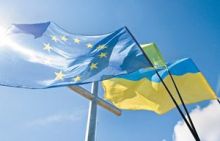The Ukrainian Ambassador to Russia Volodymyr Yelchenko recently reproved Ukrainian television managers in a rather biting manner, by saying they lack will and competence to realize the promised presence in the Russian information space, reports UNIAN.
“The unwillingness or inability of some people to solve this problem impedes the process [of beginning the broadcast of Ukrainian channels in Russia]. To say more — it is my personal opinion — this is a wish of some people to solve their own issues at the expense of the state,” the ambassador pointed out during a press conference in Moscow.
The ambassador must have some reasons for such statements. But it is also obvious that the problem of Ukraine’s foreign information policy lies not only in the lack of will that is needed to enter the global arena, but first of all in the lack of content. One should enter foreign markets with something that could in an accessible and interesting way, and on a high quality level, explain Ukraine to the world, and especially to those Russians who are ready to accept arguments. If you switch on the TV set right now, you won’t find a product of this level.
So far Ukraine hasn’t learn to tell the world about itself. And this must be one of the reasons why Europe (actually, also Ukraine) knows little about the true past of the post-Soviet territory and hence poorly understands what happens here today, and what the danger of potentially explosive processes is in this seemingly geopolitically distant post-Soviet world. Thus, it is mainly journalists of western periodicals that add understanding of the half-a-century (at least) old past and analyze events in Eastern Europe, taking into account the historical traumas of the 20th century.
The Day got acquainted with the reporter of Die Welt in Poland and Ukraine Gerhard Gnauck a few years ago, when the journalist came to Ukraine to talk to Ukrainian students and also to present his book Wolke und Weide: Marcel Reich-Ranickis polnische Jahre (Cloud and Willow. Polish Years of Marcel Reich-Ranicki). Then we talked to Gerhard Gnauck, mostly about the problems of “including” Ukraine in the collective memory of Europe (No. 94, June 5, 2009). Today it seems to us that the topic is not yet exhausted and therefore we continue this conversation.
Ukraine, Belarus and Russia do share many common problems; however, these problems have different roots: in Russia — a delusion of grandeur, in Ukraine — a post-genocidal syndrome. In your opinion, does Europe understand post-Soviet processes deeply enough?
“The problems of society and economy may have a common origin, while questions of identity, political, cultural and spiritual orientations are different. In Europe — speaking about the EU — there are many research centers and other, if one can say so, observers who keep track of events in the east of Europe. Certainly, now one can’t observe any admiration and enthusiasm on their part as it was after bringing down the ‘wall’ or, say, after the Orange Revolution. On the other hand, today citizens of Western Europe to some extent can say: if this happens in the east, this doesn’t concern us directly. There is no war, no flow of refugees. So the events in Ukraine and other Eastern European countries today are to a great extent the interest of our experts and politicians. And also your writers, artists and intellectuals: let them tell us what happens in your country. Who will if they won’t?”
In Russian mass media there is a new round of discussions about the possible consequences of Lenin’s reburial. It turned out that the “chieftain” still influences the current political situation. In Ukraine a dead Stalin is exacting his revenge on living Ukrainians. In his interview the Polish Foreign Minister Radoslaw Sikorski told you that both fascism and communism have still not been properly evaluated. In view of this, how much do you think the incurable past of both the post-Soviet territory and Europe determines the face of these regions today?
“Suffice it to look at cities like Lviv or Vilnius to understand how the twin-brothers Adolf and Joseph ‘worked’ there. These are the cities which lost most of their former residents. Thanks God, monuments of architecture were preserved. Regarding these two regimes: fascism was more ‘properly’ assessed since it failed in 1945. The problem of Russians and to some extent of their neighbors is, as Putin recently said, that they are ‘a nation of winners’ of 1945 and that this troubled victory, unfortunately, was achieved under Stalin’s auspices. This gave the tyrant and the entire Soviet state the luster they would have never gotten otherwise.”
The processes taking place not only in Ukraine but also in Belarus, Georgia and partly in Baltic states show that in the global historical sense the struggle persists and it didn’t stop for a moment. In view of this, to what extent can journalism in post-Soviet countries, including Ukraine, afford to be unbiased and impartial?
“A journalist, a newspaper or a channel can have their own sympathies, their opinions, and their worldview. But at this, of course, they must observe principles of objectivity, not soiling their hands with sponsored materials, not participating in the games of special services. Being impartial? Well, if it deals with an independent state with a democratic regime and the journalist supports it, how can he or she be impartial if these values are endangered? We are not typewriters, we are citizens.”
You recently wrote that “trustful partnership and real modernization in Russia will most likely be possible after the generation of Putin will go away.” But what can guarantee that the generation after Putin, after Lukashenko and after Yanukovych will be different? The conditions necessary for the formation of a completely different mentality in post-Soviet countries are still absent?
“The former chancellor Helmut Schmidt said during perestroika years that the development of a new generation of entrepreneurs in Russia will take ‘one night, nine months and forty years.’ So far only 20 years have passed. Besides, as it is known, since 2,000 people from old special services in Russia got an extremely strong position in the state (less so in Belarus and Ukraine). This caused a qualitative change in the state — toward old ways of thinking. Look at the foreword of Moskauer Monitor, the blog of the Moscow reporter of the Frankfurter Allgemeine Zeitung Kerstin Holm. There Holm calls Russia ‘the first state in the world de-facto governed by special services.’ It’s interesting whether politicians in the EU are aware of this change? The situation in Ukraine is different, but it is similar to Russian due to the fact that the government feels comfortable only when ‘enemies,’ for example Minister Lutsenko — are in prison.”
In your opinion, what are the main problems of the European community today? What were the key mistakes of the EU? What can consolidate the EU today?
“I cannot suggest a therapy, only a partial diagnosis. One of the directions of the EU action lied in the redistribution (certainly, under a strict control) of money from rich member-countries to poor ones, and helping them develop. And now, during the economic crisis, we observe the flow of funds from countries with a worthy financial policy to not unworthy ones. This was not a plan of the EU’s creators! The fact that, after all, there is still governance in the EU countries is comforting — that Merkel acts and that many citizens, including those in Poland, trust her. But the fire is again extinguished by politicians of certain countries, not the commission in Brussels. The trust of German citizens for the EU as a project of our future will very much decrease.”
Neo-Stalinism or Orthodox Stalinism, which is imposed not only on Russian but also Ukrainian society, is an element of building of the so-called “Russian world” that, in fact, is a threat, and first of all for Europe. How can Europe oppose it?
“Not long ago the Polish publishing house Rosner published the recollections of a professor of history, and after 1989 — a diplomat, ambassador in Paris and Moscow, in 2005-06 Minister of Foreign Affairs of Poland, the late Stefan Meller. The book is memoirs in the form of an interview. A very interesting and even entertaining book came of it. He speaks of Russia with love and realism. I will quote Meller: ‘Russia remained a schizophrenic country. On the one hand, it is ‘fashioned’ by Western clothes, cars, food, music and movies, and on the other hand — it is traditionally and invariably anti-Western. This is indeed an exclusive mixture.’ Russia is simply a different model of society, a different cultural orientation. Regarding the ‘Russian world,’ it is difficult for me to say whether it is a superficial slogan or something deeper. But if this is a slogan under which the conquering of Ukraine by Russia or even uniting is advocated, this would be dangerous. How can Europe oppose? First, it must analyze and understand what happens, what it must protect and when to fight for its values.”
“Europe doesn’t need Russia,” you wrote in the title of one of your recent articles. Why, in your opinion, doesn’t Europe need Russia? And why does Europe need Ukraine?
“I wrote that Russia needs Europe much more than the other way round. The West likes to overestimate Russia. This is the heritage of the cold war era. No one in Germany knows that today German trade with the Czech Republic exceeds trade with Russia; the German insurance company Euler Hermes, a giant that provides guarantees for export credits, helped German export in Russia more than in any other direction. In other words, in Germany’s policy Russia still has a special status. This is the heritage of the USSR and it’s time to put an end to it. And Ukraine? In a solely material sense the European Union ‘doesn’t need’ Ukraine. But in this case this European magnetism can work that led to settling the conflicts between Poland and Lithuania, Slovakia and Hungary, and everyone reformed administration and economy, strengthened freedoms, only to become a member of the big European family. There is an orientation toward Europe in Ukrainian society. The task of Kyiv is to make this direction a priority and realize it, the task of the EU is to overcome their short-sighted selfishness and help [Ukraine get in], and Russia’s task is the easiest one — not to interfere.”
The Day’s FACT FILE
Gerhard Gnauck was born in 1964 in Warsaw. He studied history, Slavic studies and political science in Mainz and West Berlin. Since 1988 he has been working in journalism, in 1995-98 at the Frankfurter Allgemeine Zeitung, in the politics department. Since 1999 he has been Die Welt’s reporter in Warsaw, covering Poland and Ukraine.








